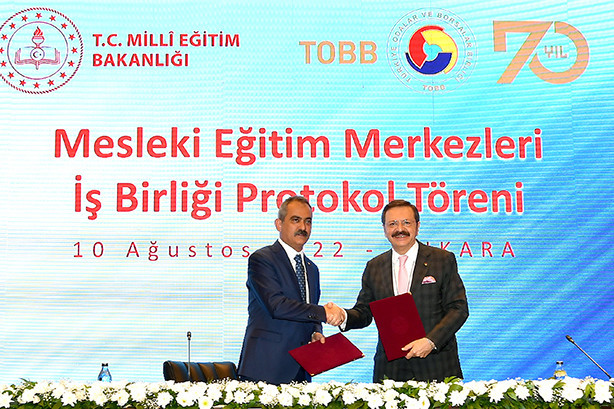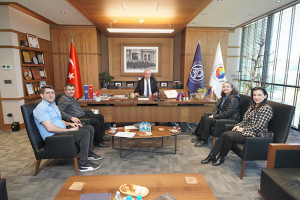
Vocational Training Centers Cooperation Protocol Signed between MEB and TOBB
Vocational education is the basis of domestic and national production, which is one of the most important elements of development.
Because the qualified workforce that will provide domestic and national production can only be realized with a qualified education system and quality vocational training. With this vision, TOBB and Chamber-Borsa support vocational training for its members to reach qualified human resources. Again, based on this understanding, the Ministry of National Education works to establish a quality and need-oriented education system and thus to provide qualified workforce that will strengthen the production power of our country. In this context, special importance is given to vocational training centers, which are the carriers of the Akhism culture, especially in vocational education.
When Vocational Education Center students graduate, they are employed by employers as well-trained masters in their fields. 88% of the students graduating from vocational training centers are employed in their field of education. In order to strengthen the infrastructure of Vocational Training Centers that contribute to the qualified workforce of our country with a high employment rate, some arrangements have been made by the Ministry of National Education upon the request of TOBB and the Chamber-Exchange community.
With the legislative arrangements made;
1- Vocational Education Centers are included in the scope of compulsory formal secondary education. Anyone who is at least a secondary school graduate can enroll in this program, regardless of age.
2- Students can get a Vocational High School diploma by taking the difference courses in their own schools. Thus, the biggest obstacle in front of Vocational Education Center students being considered high school graduates has been removed.
3- Students enrolled in the Vocational Training Center program receive theoretical training at school one day a week and skills training four days a week in the enterprise they have signed a contract with.
4- In the Vocational Education Center program, the education period is four years and the students; He gets a journeyman certificate at the end of the 11th grade and a mastership certificate at the end of the 12th grade. Students who complete the diploma difference courses also graduate with a vocational high school diploma.
5- Work accident, occupational disease and sickness insurance premiums of the students are covered by the state during the education period.
6- The employers pay no less than 30% of the minimum wage (1,650 TL.) to 9th, 10th and 11th grade apprentice students and 50% of the minimum wage (2,750 TL.) to 12th grade journeyman students.
7- These paid fees were paid back to the enterprises as State Contribution, and the financial burden on the enterprise was completely removed.
8- The “Vocational Training Center Mastery Compensation Program”, which lasts for a maximum of 27 weeks, was initiated in order to enable high school and higher graduates to have a job in a short time and thus to reduce youth unemployment.
9- All of the courses in the mastery make-up program are held in the enterprise.
10- Students enrolled in this program are considered as 12th grade students and are paid a fee of not less than 50% of the minimum wage (2,750 TL.).
11- Work accident, occupational disease and sickness insurance premiums of these students are covered by the state during the education period and the wages paid by the enterprise are paid back to the enterprises as State Contribution.
12- Students who have completed the education period receive a mastery certificate if they are successful in the skill exam to be held.
The arrangements made were welcomed by both employers and students, and the demand for the vocational training center program increased significantly. In fact, while the number of apprentices and journeymen registered in the vocational training center program was approximately 160 thousand before the legal regulation on 25 December 2021, it has exceeded 600 thousand with an increase of 275 percent as of 10 August 2022. With the Vocational Training Centers Cooperation Protocol signed between the Ministry of National Education and the Union of Chambers and Commodity Exchanges of Turkey (TOBB) on 10 August 2022 in order to announce the vocational training center program to wider masses; “In order to ensure the coordination of the education system with the developments in the sector, to meet the qualified human resource needs of the sector and to contribute to employment, the cooperation of the Chambers/Exchanges affiliated to TOBB and vocational training centers throughout the country will be ensured.”
Within the scope of the protocol;
1- The Chambers/Exchanges that will work in coordination with the Vocational Training Centers to be included in the protocol will be determined,
2- The workshop and laboratory needs of the Vocational Training Centers included in the scope of the protocol will be determined and equipped / supported / training material support will be provided based on new technologies,
3- In-service training/on-the-job training/distance training activities to be organized for managers and teachers working in Vocational Training Centers will be planned,
4- Curriculum and training materials will be updated,
5- Participation in education and training will be increased with the dissemination of Vocational Education Center program applications,
6- Vocational Training Centers Studies will be carried out to increase the number of students and to meet the human resources needed by companies from Vocational Training Centers.



